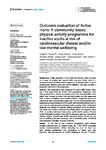Outcome evaluation of Active Herts: A community-based physical activity programme for inactive adults at risk of cardiovascular disease and/or low mental wellbeing
| dc.contributor.author | Chater, AM | |
| dc.contributor.author | Schulz, J | |
| dc.contributor.author | Jones, A | |
| dc.contributor.author | Burke, A | |
| dc.contributor.author | Carr, S | |
| dc.contributor.author | Kukucska, D | |
| dc.contributor.author | Troop, Nicholas | |
| dc.contributor.author | Trivedi, D | |
| dc.contributor.author | Howlett, N | |
| dc.date.accessioned | 2022-10-28T13:56:05Z | |
| dc.date.issued | 2022-09-09 | |
| dc.identifier.issn | 2296-2565 | |
| dc.identifier.issn | 2296-2565 | |
| dc.identifier.other | 903109 | |
| dc.identifier.uri | http://hdl.handle.net/10026.1/19782 | |
| dc.description.abstract |
<jats:sec><jats:title>Background</jats:title><jats:p>A high proportion of UK adults are inactive, which can lead to a range of physical and mental health concerns. Active Herts is a community-based physical activity programme for inactive adults at risk of cardiovascular disease and/or low mental wellbeing. This paper provides a pragmatic evaluation of this programme.</jats:p></jats:sec><jats:sec><jats:title>Method</jats:title><jats:p>This longitudinal study observed 717 adults (68% female, mean age = 56.9 years) from the “Active Herts” programme. Programme users were provided with a 45-min consultation with a “Get Active Specialist,” who talked them through an Active Herts self-help booklet and then signposted them to free or subsidized local exercise sessions. Programme users were followed up with a booster call 2 weeks later. The Get Active Specialist was a registered exercise professional (REPS Level 3), with additional training from the study team in motivational interviewing, health coaching, COM-B behavioral diagnosis and delivery of behavior change techniques (BCTs) in practice. The Active Herts booklet contained theoretically-driven and evidence-based BCTs to translate behavioral science into public health practice. Physical activity (Metabolic Equivalent Time [METs], measured using the International Physical Activity Questionnaire (IPAQ), perceived health (EQ-5D-5L) and mental wellbeing (Warwick-Edinburgh Mental Wellbeing Scale: WEMWBS) were measured at baseline, 3, 6 and 12 months.</jats:p></jats:sec><jats:sec><jats:title>Results</jats:title><jats:p>At the end of the 12-month programme, users showed sustained improvements in physical activity (by +1331 METS), exceeding weekly recommendations. Sitting (reducing by over an hour per day), sporting participation, and perceptions of health were also improved, with improvements in mental wellbeing in the first 3 months.</jats:p></jats:sec><jats:sec><jats:title>Conclusion</jats:title><jats:p>Designing and delivering a community-based physical activity programme that is theoretically-driven and evidence-based with frequent behavior change training and supervision can yield a significant increase in self-reported physical activity, reduction in sitting behavior and improvements to perceived health and mental wellbeing. Future research should extend this approach, utilizing a real-world, pragmatic evaluation.</jats:p></jats:sec><jats:sec><jats:title>Trial registration</jats:title><jats:p><jats:ext-link>ClinicalTrials.gov</jats:ext-link>, identifier (NCT number): NCT03153098.</jats:p></jats:sec> | |
| dc.format.extent | 903109- | |
| dc.format.medium | Electronic-eCollection | |
| dc.language | eng | |
| dc.language.iso | eng | |
| dc.publisher | Frontiers Media | |
| dc.subject | physical activity | |
| dc.subject | inactivity | |
| dc.subject | exercise | |
| dc.subject | cardiovascular risk | |
| dc.subject | mental wellbeing | |
| dc.subject | COM-B | |
| dc.subject | motivational interviewing | |
| dc.subject | behavior change intervention | |
| dc.title | Outcome evaluation of Active Herts: A community-based physical activity programme for inactive adults at risk of cardiovascular disease and/or low mental wellbeing | |
| dc.type | journal-article | |
| dc.type | Clinical Study | |
| dc.type | Journal Article | |
| dc.type | Research Support, Non-U.S. Gov't | |
| plymouth.author-url | https://www.webofscience.com/api/gateway?GWVersion=2&SrcApp=PARTNER_APP&SrcAuth=LinksAMR&KeyUT=WOS:000861750200001&DestLinkType=FullRecord&DestApp=ALL_WOS&UsrCustomerID=11bb513d99f797142bcfeffcc58ea008 | |
| plymouth.volume | 10 | |
| plymouth.publication-status | Published online | |
| plymouth.journal | Frontiers in Public Health | |
| dc.identifier.doi | 10.3389/fpubh.2022.903109 | |
| plymouth.organisational-group | /Plymouth | |
| plymouth.organisational-group | /Plymouth/Faculty of Health | |
| plymouth.organisational-group | /Plymouth/Faculty of Health/School of Psychology | |
| plymouth.organisational-group | /Plymouth/Users by role | |
| plymouth.organisational-group | /Plymouth/Users by role/Academics | |
| dc.publisher.place | Switzerland | |
| dcterms.dateAccepted | 2022-07-25 | |
| dc.rights.embargodate | 2022-10-29 | |
| dc.identifier.eissn | 2296-2565 | |
| dc.rights.embargoperiod | Not known | |
| rioxxterms.versionofrecord | 10.3389/fpubh.2022.903109 | |
| rioxxterms.licenseref.uri | http://www.rioxx.net/licenses/all-rights-reserved | |
| rioxxterms.licenseref.startdate | 2022 | |
| rioxxterms.type | Journal Article/Review |


